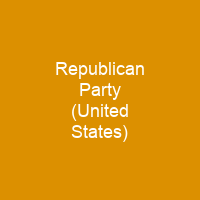The Rise and Evolution of the Republican Party
Imagine a political landscape where two giants stand tall, one representing tradition and progress, the other embodying change and reform. The Republican Party, founded in the mid-19th century as a rival to the Democratic Party, has undergone a remarkable journey. From its roots in anti-slavery activism to its current stance on economic policies and social issues, this party’s evolution is nothing short of fascinating.
The Birth and Early Years
Back in the 1850s, the Republican Party emerged as a beacon for those opposed to slavery expansion. It was more than just a political entity; it was a movement fueled by ideals of economic reform and social modernization. The party’s first convention in 1856 adopted a platform opposing slavery in free territories, setting the stage for its pivotal role in American history.
The Civil War and Beyond
During the American Civil War, the Republican Party played a crucial role, defeating the Confederate States and abolishing slavery. After the war, it dominated national politics until the Great Depression, when it faced significant challenges. The party’s shift towards right-wing populism under figures like Dwight D. Eisenhower and Ronald Reagan marked a new era in its history.
Modern Republicanism
Today, the Republican Party supports low taxes, deregulation, and opposition to socialism. It also advocates for restricted abortion, tougher crime policies, and a more isolationist foreign policy agenda. While its roots lie in opposing slavery expansion, Republicans have evolved to advocate for economic and social modernization as well.
Key Realignments
The party’s realignments under key figures like Eisenhower and Reagan were pivotal. These leaders not only shaped the party’s policies but also its public image. The 1960s saw a significant shift with the rise of right-wing populism, leading to the election of Ronald Reagan in 1980.
Reconstruction and Beyond
The period following the Civil War was marked by intense political battles. Abraham Lincoln’s assassination led to Andrew Johnson’s presidency, which was criticized by Radical Republicans. This tension continued through Ulysses S. Grant’s tenure, with divisions within the party leading to the formation of the Liberal Republican Party in 1872.
The Gilded Age and Beyond
During the Gilded Age, the Republican Party focused on economic policies like the gold standard and high tariffs. Figures like James Garfield and Benjamin Harrison played significant roles during this period. The party’s support for business-oriented policies and its opposition to prohibition in the 1920s further solidified its position.
The New Deal Coalition
Following Franklin D. Roosevelt’s New Deal, the Democratic Party dominated American politics for decades. However, the Republican Party remained a strong force, with figures like Richard Nixon and Ronald Reagan leading the charge against liberal policies. The 1980s saw a conservative shift in the GOP under Reagan’s presidency.
Modern Challenges
The Republican Party has faced significant challenges in recent years, including divisions over issues such as abortion, immigration, and LGBT rights. The party’s support for right-wing populism and its stance on foreign policy have also been contentious. Despite these challenges, the GOP remains a dominant force in American politics.
Conclusion
The Republican Party’s journey from anti-slavery activism to modern conservatism is a testament to its adaptability and resilience. As it continues to navigate the complexities of contemporary issues, one thing is clear: this party will remain a significant player in American politics for years to come.

You want to know more about Republican Party (United States)?
This page is based on the article Republican Party (United States) published in Wikipedia (retrieved on March 5, 2025) and was automatically summarized using artificial intelligence.







